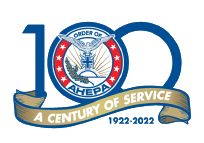History of the Order of AHEPA 1922 - 1972
Chapter Seven: The Years 1939 - 1945
Page 321
The Sixteenth Supreme Convention
August 20 to 26, 1939 - Providence, Rhode Island
The Sixteenth Supreme Convention was held in Providence, R.I., during the week of August 20-26, 1939. Convention Officers elected were: Alexander D. Varkas, Chairman; Daniel Pananicles, Vice Chairman; and Peter T. Kourides, Secretary.
The major actions of the convention included:
(1) That an excursion to Greece be held in 1940;
(2) Required that to be eligible for the office of Supreme President a member must have served in an elective Chapter, District or Supreme Lodge office;
(3) Established the office of national Executive Secretary at the Headquarters in Washington, D.C., to assume the duties previously undertaken by the Supreme Secretary;
(4) Selected Seattle, Washington, as the site of the 1940 Supreme Convention;
(5) Gave final official recognition to the Daughters of Penelope as a senior auxiliary of the Order of Ahepa;
(6) Donated $1,500 to the Pomfret Theological School;
(7) That the Ahepa Sanatorium Board of nine members shall be elected as follows: 4 by Silver District #17, 4 by the Supreme Convention, and the Supreme President to be the ninth member.
The new Supreme Lodge elected for the year 1939-40 was:
V. I. Chebithes, Supreme President (elected for his fifth consecutive term, 1935-39, and previously elected for three terms (1924-1927) for a total of 8 terms as Supreme President of the fraternity); Van A. Nomikos, Supreme Vice President; Louis P. Maniatis, Supreme Secretary; John G. Zazas, Supreme Treasurer; Constantine G. Economou, Supreme Counsellor; George E. Loucas, Supreme Governor; George Papaeleas, Supreme Governor. John L. Manta, Dr. S. D. Zaph, and Chris E. Athas were re-elected to the Sanatorium Board of Directors.
AHEPA Dedicates Dr. Samuel Gridley Howe Memorial at Brown University
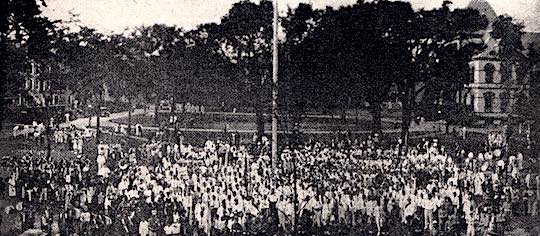
1939 - Dr. Samuel Gridley Howe Memorial Dedication
The Order of AHEPA dedicates memorial flag-mast to Dr. Samuel Gridley Howe on campus of Brown
University (Providence, Rhode Island) during the 16th National AHEPA Convention.
During the Providence convention, the Order of AHEPA dedicated its memorial to Dr. Samuel Gridley Howe, American philhellene of the Greek Revolutionary War of 1821, at Brown University.
The memorial was a base of granite upon which rested a flagpole, the 50-foot flagpole once a mast of the America Cup defender "Columbia." Howe was a graduate of Brown University. Mrs. Maud Howe Elliott, surviving daughter of Samuel Gridley Howe, attended the ceremony, as did many university, city, and state officials.
Newport Mercury News – August 25, 1939
Mrs. Maud H. Elliott Takes Part in Exercises in Honor of her Father
A monument will rise on the campus of Brown University in honor of Dr. Samuel Gridley Howe. Ground for the memorial was broken Thursday at the conclusion of a parade by over 2,000 members of the Ahepa who are attending the sixteenth annual convention of the Order in Providence. …
Inscriptions on four faces denotes his service to the Greek people and also his interest for in work for the blind at Perkins Institute. This is the inscription:
Front – A memorial to Samuel Gridley Howe of the Class of 1821 in Recognition of his Service to Greece.
West - Samuel Gridley Howe, 1801 – 1876. Whose service as Surgeon in Chief to the Fleet in the Greek War of Independence and Whose Friendship for the Greek People Have Given Him a Place of Honor in their Memory.
East - Samuel Gridley Howe, 1801 – 1876. Whose Pioneer work in the Education of the Blind in the Perkins Institution made Him a Benefactor of Mankind.
South – Erected by the American Hellenic Education Progressive Association 1939. A Gift to Brown University from Residents of the United States whose family origins were in Greece.

1939 - Dr. Samuel Gridley Howe Memorial Dedication
Page 322
Delegates to the Providence Convention were:
Supreme Lodge - V. I. Chebithes, Van A. Nomikos, Louis P. Maniatis, John G. Zazas, A. A. Pantelis, George E. Loucas, James J. Dikeou, Constantine Halikas.
Mother Lodge - James Campbell, George A. Polos, John Angelopoulos.
Past Supreme Presidents - George Demeter, Achilles Catsonis, Harris J. Booras.
District Governors - Peter N. Derzis, Theodore Agnew (father of Vice President Spiro T. Agnew), Arthur A. Karkalas, Sidney P. Skokos, Stephen Scopas, James Mazarakos, Peter L. Bell, James L. Sardonis, Tom Drellis, Milton Kourbetis, Harry A. Reckas, Sam Sclavenites, George M. Poulos, Panos Lampros, George N. Kalkas.
In addition, there were 245 Chapter Delegates who attended the convention. (Although we made it a practice to list all of the Chapter Delegates to all previous Supreme Conventions, the increasing number of such delegates makes it no longer practicable to continue publishing these lists. Space has become a factor. We apologize for not being able to print these lists in the remaining pages of this book, but feel that our readers will agree with us that it isn't practical, since almost 50 such meetings are involved. We do wish to pay tribute to those delegates of the 1923 through 1938 conventions, who represented Ahepa during its most crucial years, at the national meetings. We will only list the Supreme Lodge, Mother Lodge, Past Supreme President, and District Governor delegates in the following pages.)
Emmanuel A. Cavacos of Baltimore receives the silver medal of the Legion of Honor from France for his contributions to French art. … Alex Kampouris New York infielder, is honored by New York Ahepans at a major league game in New York … . Steven Anastasion of New Haven, Conn. enters Annapolis Naval Academy as a midshipman. He was former president of the New Haven Sons of Pericles chapter. … Fargo, N.D. Chapter "Parthenon" float and marchers win plaudits in Golden Jubilee celebration.
The First National Olympiad of Ahepa was held at the 1939 Providence, R. I. Supreme Convention, and competition was held between young American athletes of Greek descent in track and field events, under the direction of Van A. Nomikos, national director of athletics, and assistant athletic director Peter Clentzos of California. This was the forerunner of a continuous line of annual Ahepa Olympiads held every year thereafter at Supreme Conventions. One of the contestants in the 100-yard dash, where he finished third was Spiro T. Agnew, Vice President of the United States. He also finished third in the 120 yard low hurdles. He attended the convention with his father, Theodore Agnew, who was then (1939) Governor of District No. 3 of the Ahepa.
Page 323
Lieutenant Governor Charles Poletti of New York became a member of New York City Chapter No. 42 … . John A. Mehos of Boston becomes Law Clerk to the Massachusetts Supreme Judicial Court. … John Petro of Mt. Sterling, Kentucky, held a commission which read: "To the Honorable John Petro, of Mt. Sterling, Kentucky Appointed as aide-de-camp on the staff of the Governor with the rank and grade of Brigadier General. Born in the city of Loutraki, state of Corinth, Greece, but for many years a patriotic citizen of the United States and this Commonwealth." It was signed by Governor A. B. "Happy" Chandler of Kentucky, symbolic of the friendship between the two men, dating from 1914 when John Petro was manager of a restaurant in Lexington, Kentucky, and befriended a young college student, who had only a red sweater, a $5 bill, and a wonderful smile. He gave Chandler "plenty to eat because I liked him and thought him a nice fellow." John Petro helped Albert B. Chandler through college, and when "Happy" Chandler became Governor of Kentucky, he remembered his old friend who helped him when he was penniless … . George M. Paradise of Sioux City, la. Chapter becomes Commander of the Iowa Department of the American Legion … . Prof. George Yphantis of the University of Montana is recognized for his paintings, and as an instructor.
The First National Convention of the Order of Daughters of Penelope, Senior Women's Auxiliary, was held in conjunction with the Ahepa Supreme Convention in Providence, R.I., and the Grand Lodge elected was: Mrs. Emmanuel Apostolides, Grand President and Founder; Estelle Eliades, Grand Vice President; Marie Zuras, Grand Secretary; Mrs. Theodore Mangas, Grand Treasurer; Mrs. Simeon Agnos, Grand Governor; Josephine Pandell, Grand Governor.
Sons of Pericles Supreme President Nicholas L. Strike establishes three new chapters, and reactivates five inactive chapters during the period of September-November … . Father, son, and daughter (Tom Peters, Sr., Tom Peters, Jr., and Helen Peters of Fort Worth) were installed as presidents of their Ahepa, Daughters of Penelope, and Sons of Pericles chapters on the same evening … . Ahepa selected a 1939 Hellenic All-America Football team, which included: Michael Baltisaris (End, University of Tennessee); George Alevizon (Tackle, City College New York); Nick Kerasiotis (Guard, St. Ambrose); Archie Kodros (Center, University of Michigan); Peter Vires (Guard, University of Kentucky); Luke Pappas (Tackle, University of Utah); Michael Cormazis (End, Bowling Green); Nick Conteas (Quarterback, Northwestern Univ.); Louis Ghecas (Back, Georgetown Univ.); Alexander Campanis (Back, New York Univ.); Andrew Marefos (Fullback, St. Mary's) … . Frank S. Land, founder of the Order of DeMolay, authors the new Sons of Pericles initiatory degree and ritual, and is honored at a testimonial dinner in his honor by the Sons of Pericles in Chicago, on February 4, 1940 … .
The Supreme Lodge of Ahepa visits with President Franklin D. Roosevelt at the White House in March, 1940. Those making the visit were V. I. Chebithes, Van A. Nomikos, Louis P. Maniatis, John Zazas, Constantine G. Economou, George E. Loucas, and George Papaeleas.
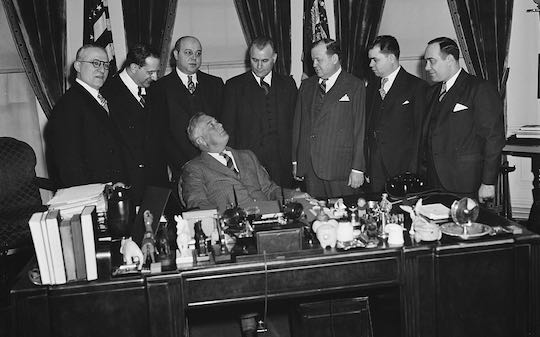
1940 - WHITE HOUSE VISIT
Order of AHEPA national officers greeted by President Roosevelt at the White House on March 6, 1940.
Pictured L to R: George Papalias, Supreme Governor; Louis P. Maniatis, Supreme Secretary; Van A. Nomikos,
Supreme Vice President; V.I. Chebithes, Supreme President; John G. Zazas, Supreme Treasurer; Constantine
Economou, Supreme Counsellor; George E. Loucas, Supreme Governor.
TThe Fifth Biennial National Banquet honoring the Congress of the United States was held on March 4, 1940 at the Mayflower Hotel, Washington, D.C. Chairman of the banquet was George Papanicholas, and Supreme President V. I. Chebithes acted as toastmaster, or "symposiarch" as he put it.
Page 324
Speakers that evening included: U.S. Senators Francis T. Maloney of Connecticut and Joseph C. O'Mahoney of Wyoming; Sons of Pericles Supreme President Nicholas L. Strike; U.S. Representative Emanuel Celler of New York; U.S. Senator Clyde Herring (Iowa); U.S. Representative Hamilton Fish of New York; U.S. Senator Burton K. Wheeler of Montana; Greek Ambassador Kirnon Diamantopoulos; Daughters Grand Secretary Marie Zuras … . Ahepa presented a check for $2,000 to Turkish Ambassador Mehmet Munir Ertegun for the relief of victims of the recent earthquake in Turkey … . The Sons of Pericles hold a national essay contest on the subject: "How American Youth of Hellenic Ancestry may best serve and protect our republican form of government in this world crisis." … The Sons also published a treatise on the events and background of the Greek Revolutionary War of 1821, written by Sons Executive Secretary George J. Leber … . John Petrow of Fremont, Nebraska appointed to the city board of public works.
The Seventeenth Supreme Convention
August 11 to 17, 1940 - Seattle, Washington
The 17th Supreme Convention was held in Seattle, Washington, during the week of August 11-17, 1940. Convention officers elected were: George C. Vournas, Chairman; P. S. Marthakis, Vice Chairman; and Peter T. Kourides, Secretary.
Delegates to the convention included:
Supreme Lodge - V. I. Chebithes, Van A. Nomikos, Louis P. Maniatis, John G. Zazas, C. G. Economou, George E. Loucas, George Papaeleas, and Constantine Halikas.
Mother Lodge - James Vlass.
Past Supreme President - George E. Phillies.
District Governors - Peter N. Derzis, Theodore Agnew, Jean M. Kossarides, James J. Starr, George E. Mortis, Thomas Kouchoukos, John P. Harritos, Zack T. Ritsos, John Ormas, William H. Girgulis, P. Pitsos, E. J. Fostinis, Andrew S. Nicholson, E. Tasso Morisse.
In addition there were 155 Chapter Delegates at the convention.
The following action was taken by the Seattle convention:
(1) Resolutions endorsing the efforts of Congress to bolster the defenses of America, urging complete preparedness of men and arms, regardless of cost or sacrifice, reaffirming Ahepa's faith in and loyalty to America, and pledging the support of the entire Order of any legislation enacted to preserve the American philosophy of life;
(2) Resolutions rededicating the Order and its members to the principles of democracy and human freedom, renouncing tyranny and despotism, and urging immediate aid to England in her struggle against the dictatorships;
(3) Established an Ahepa Board of Education to find ways and means of assisting the schools;
(4) Resolution urging the establishment of a Federal Department of Education;
(5) Selected Cincinnati, Ohio as the site of the 1941 Supreme Convention;
(6) Inserted into the Ahepa Ritual the requirement that all members initiated into the Order must recite the Pledge of Allegiance to America;
(7) Donated $1,000 to the Pomfret Theological School, in addition to individual contributions of $1,000 made by members during the convention;
(8) Donated $1,000 to the Hellenic Red Cross
(9) Authorized the new Supreme Lodge to conduct a campaign among chapters and members to raise funds for the people of Greece, who were momentarily expecting to be invaded by Italy, following months of one provocation after another by Italy against Greece by air against Greek warships and shipping.
(Continued on page 326)
Page 325
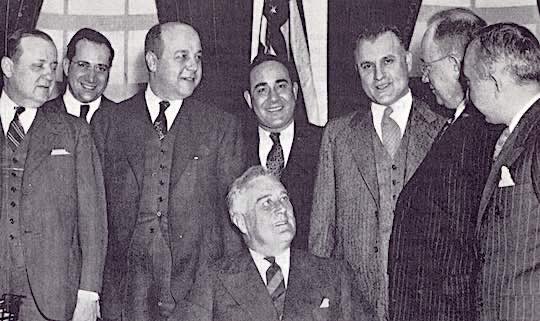
1939 - AHEPA White House Visit
With President Franklin D. Roosevelt are: John G. Zazas, Louis P. Maniatis, Van A. Nomikos, George E. Loucas, V. I. Chebithes, A.A. Pantelis, James G. Dikeou
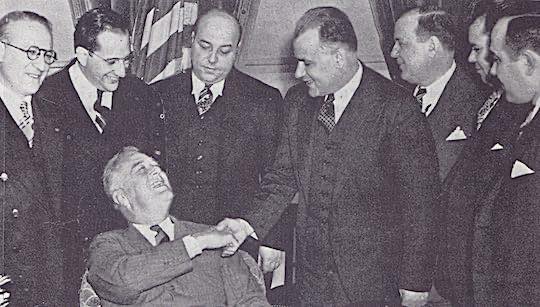
1940 - AHEPA White House Visit
With President Franklin D. Roosevelt are: George Papaeleas, Louis P. Maniatis, Van A. Nomikos, V. I. Chebithes, John G. Zazas, Constantine G. Economou, George E. Loucas
Page 326
(Continued from page 324)
Greece Invaded
Although Greece used every means within reason to avoid retaliation and war, on October 28, 1940, Italian Ambassador Grazzi called upon Greek Prime Minister John Metaxas at 3 a.m. with an ultimatum, which was actually a declaration of war. The ultimatum was that Italy demanded the right to occupy with her armed forces and for the duration of the war with England, a number of strategic points in Greek territory, and that Greece must not oppose or resist such occupation. Metaxas had three hours in which to reply, but his immediate reply was: "OXI!"
OXI became a symbol and watchword for Greece in the war that followed and which began with fighting at 5:30 a.m. the same morning, October 28, 1940, on the Albanian border. Despite numerical and superior forces thrown by Italy against Greece, the Greeks held their own for weeks, and then began to rout the Italian armies.
From October 28, 1940 until April 6, 1941, the Greek soldiers defeated the Italians in almost every action, and were ready, and actually had crossed the border into Albania. Hitler then finally had to go to Mussolini's rescue, although it forced him to alter his attack on Russia. With German soldiers, tanks, and devastating air power, Hitler's armies defeated Greece in a little more than 3 weeks, but this momentary diversion by the German armies gave the Allies invaluable time, and the delay actually proved fatal to the German plans to conquer Russia. For Greece, it was a costly, destructive war, and the country was plunged into years of terrible hardship under German and Italian rule. Although able to withstand the two-to-one and sometimes three-to-one odds of the Italian armies, whom they defeated, the Greek army was unable to withstand the giant, continuous blows that the Germans struck in their invasion.
Greece was No. 9 on Germany's list of conquered countries: Czechoslovakia (March 15, 1939); Denmark and Luxembourgh, April and May, 1940, surrendered without fighting; Poland, September - October, 1939, resisted for 30 days; Norway held out for 61 days, April - June, 1940; Holland resisted only four days, May, 1940; Belgium for 18 days, May, 1940; and France for only 43 days, May - June, 1940. Greece resisted the Germans for 21 days, holding out for that length of time, after already having fought the Italians for more than five months.
The concern of the 1940 Seattle Supreme Convention delegates for Greece two months before hostilities began was simply because all evidence pointed to Greece as the next target for either Mussolini or Hitler, or both.
Page 327
Ahepans were personally worried and concerned since they practically all had parents, sisters and brothers, and relatives living in Greece, and there was no doubt that the little country would suffer tremendously if the war reached inside her borders. There was no doubt in any Greek-American or Ahepan's mind but that Greece would resist any attempt at invasion; there was also little doubt as to the eventual outcome, following Hitler's previous displays of total war tactics throughout Europe. Therefore, there were immediate plans to do whatever possible to help their parents, and families in Greece.
Going back to the 1940 Seattle Supreme Convention held in August, 1940, the delegates elected the following new Supreme Lodge for fiscal year 1940-41: Van A. Nomikos, Supreme President; George C. Vournas, Supreme Vice President; Peter T. Kourides, Supreme Secretary; Charles Davis Kotsilibas, Supreme Treasurer; Daniel Pananicles, Supreme Counsellor; Charles N. Diamond, Supreme Governor; George Kisciras, Supreme Governor.
Saginaw, Mich. chapter purchased a church and established a comunity for local Greek-Americans … . Cleveland, Ohio dedicated to the city a Greek Cultural Garden in Rockefeller Park … . In September, 1940, the Supreme Lodge announced that a total of $175,500 had been collected and disbursed for the Ahepa National Sanatorium in Albuquerque … . By October, 1940, the Daughters of Penelope had established their 95th chapter since their founding … . Senator William King of Utah makes a plea on the floor of the U.S. Senate for U.S. aid to Greece in her war against Italy: "I sincerely hope that the Members of this legislative body will lift their voices in the defense of liberty, and that they will properly appraise the responsibilities resting upon them and upon our country, and support measures that will afford assistance to those peoples and countries who are now fighting for liberty and civilization." He also spoke again later in November, 1940, asking that the United States respond to an appeal from the Greek nation for food, clothing, and medicines.
The Greek War Relief Association is formed as a national fundraising unit to send food, clothing and medicines to Greece, with Spyros P. Skouras as National President. The Order of Ahepa, and all other Greek-American organizations and associations throughout the United States and Canada, worked together in raising funds in every major city and town in America and Canada. Individual contributors were not limited to Greek-Americans or Canadian-Americans, but included business firms, banks, corporations, and names like Rockefeller, Kent, Astor, James, Schenck, Sears, Whitney. More than $300,000 was raised by the first of December, 1940, when the first count was taken. Supporters of Greek War Relief included names like financier George Blumenthal, New York City Council President Newbold Morris, Samuel Goldwyn, historian Hendrick Willem Van Loon, Rabbi Stephen S. Wise, historian Truslow Adams, John Erskine, Booth Tarkington, J. P. Morgan.
Page 328
Some of the statements made by them include:
"The courage of Greek troups and civilians in the face of overwhelming odds against them gives renewed spirit and strength to the people of Europe already subjugated and to those who still remain free." … "The tragedy of war never calls for applause, but certainly the entire free world is applauding the armies of Greece today. The magnificent Greek race, contributors to world culture since ancient times, is fighting for its existence as are all free people of the democratic world. The United States as a country, and all of us as Americans, stand firmly behind Great Britain. In the same whole hearted way we will stand behind Greece." … "We should give all possible support to the Greeks because to their own great discomfort and at their own terrific cost in blood and material wealth, they happen to be doing the job which is really our job. They are making the world safer for us over here by making it unsafe for Mussolini. And by making it unsafe for Mussolini, they are making it much less safe for Hitler, and that is the fellow we are after because he is after us. But 7 million people cannot hope to hold out forever without some material support from the outside. Those Greek soldiers who are now fighting our battle, those Athenian and Spartan regiments, have wives and children at home who need food and clothes and medical supplies. We can contribute the money needed for that food and those medical supplies." … "With all Americans I rejoice in Greek triumph and hope for the ultimate and complete Greek victory over totalitarianism and tyranny. Every American must contribute towards Greek War Relief needs." … "If the cause of democracy deserves aid anywhere it is in Greece, where the noblest spirit of the ancient world has come alive again. Today, every American is in some sense a child of the Acropolis."
Anthony Serkedakis of Washington, D.C. enters the U.S. Naval Academy at Annapolis … . Winners of the Sons of Pericles National Essay Contest were the following, in order of prize finish: Chris G. Petrow, Ames, Ia.; Jerry P. Hontas, Canton, Ohio; George C. Mitchell, Kearney, Nebraska; Cae Fellouris, Boston; Mary Ann Theodoredis, Bethlehem, Pennsylvania; John D. Blecatsis, Manchester; Gus Sotiropoulos, Springfield, Ill.; Louis Geannopoulos, Chicago.
Visit with President Roosevelt
The Ahepa Supreme Lodge again visits with President Franklin D. Roosevelt at the White House. The visit was made on April 25, 1941 by Supreme President Van A. Nomikos, Vice President George C. Vournas, Secretary Peter T. Kourides, Treasurer Charles Davis Kotsilihas, Counsellor Daniel Pananicles, Governor Charles N. Diamond, and Governor George Kisciras. Brother Ahepan, President Roosevelt, gave this message to the Supreme Lodge:
The heroic struggle of the Greek people to defend their liberties and their homes against the aggression of Germany after they had so signally defeated the Italian attempt at invasion has stirred the hearts and aroused the sympathy of the whole American people. During the Hellenic War of Independence more than a century ago our young nation, prizing its own lately-won independence, expressed its ardent sympathy for the Greeks and hoped for Hellenic victory. That victory was achieved.
Page 329
Today, at a far more perilous period in the history of Hellas, we intend to give full effect to our settled policy of extending all available material aid to free peoples defending themselves against aggression. Such aid has been and will continue to be extended to Greece. Whatever may be the temporary outcome of the present phase of the war in Greece, I believe that the Greek people will once more ultimately achieve their victory and regain their political independence and the territorial integrity of their country. In that high objective, the people of Greece can count on the help and support of the government and the people of the United States.
Within a very few days following President Roosevelt's statement, Greece was conquered by the German armies, despite a heroic Greek resistance.
A published statement of those days, by the former Foreign Minister of Italy, was a warning to the United States: "American democracy has in its bosom more dangerous enemies than writers ready to compromise with dictators. This enemy is Complacency. Complacency is almost as dangerous as Fifth Columnism."
George M. Paradise of Sioux City, past District Governor, is appointed a District Judge of Iowa … . Spyros P. Skouras, Ahepan of many years, and National President of the Greek War Relief Association said:
"When the history of the present struggle is written in a world at last at peace -- a victorious peace that Greece helped give the world by sacrificing its blood --the part played by Ahepa will stand out boldly in letters that can never be erased. I am proud to call myself a member of the Order of Ahepa" Brother Skouras also reported that $2,750,000 in cash had already been sent to Greece, and also more than $2,500,000 in medical supplies, food and clothing, during the first few months of the drive. "With Ahepa's knowledge of organization and the high type of individual that Ahepa has developed through its teachings, they were able to supply nearly 90 per cent of the manpower needed to create the proper machinery to handle the enormous task we undertook to bring aid to stricken Greece," Brother Skouras said. "In shaping this Association (Greek War Relief Association) into a coherent and effective agency for bringing relief to Greece, the Order of Ahepa has played a very important role. With their knowledge and appreciation of organization, they stepped into the picture with all the vigor at their command. Here was the supreme test in the history of Ahepa. They rose to meet it magnificently, and I can attribute the successful endeavors of the Greek War Relief Association largely to their unselfish efforts and splendid organization."
Page 330
The American Red Cross notified Ahepa in January, 1941, that a total of $1,176,000 was being shipped to Greece by the Red Cross in the form of food, clothing and medical supplies that month … . Every Ahepa Chapter was now totally involved in only one goal -- raising funds for food, clothing and medical supplies for the Greek people. Both through and with the Greek War Relief Association units being established, the drive was on in earnest, and every means possible to raise funds was being used, with monies going directly into the Greek War Relief offices in New York City, or into the Ahepa Headquarters in Washington, D.C., from where they were immediately sent on the Greek War Relief offices.
Ahepans in various businesses, donated total business receipts for one or more days for Greek War Relief; through the efforts of the Skouras Brothers, and other Ahepans in the theatre business, special ticket sales receipts and donations made by theatre-goers, raised funds. Chapters held benefit dances; members of the Ahepa, Daughters of Penelope, Maids of Athena, and Sons of Pericles, dressed in Greek native costumes, stood on busy downtown street corners and solicited funds. It would be impossible to enumerate or list funds and amounts from specific chapters, but they ranged from $300 in smaller towns, to as much as $7,576.00 in cities ranging in the area of a million population, to more than $25,000 from the largest metropolitan cities, and all this within the first four months of the drive. One lad raised $300 alone in downtown Flint, Michigan, in two days, dressed in the Greek Evzone costume.
As the drive continued, funds poured in from sympathetic non-Greek business firms and individuals. The American people were not only deeply impressed with Greece's valiant determination to protect and maintain her homeland, but began to realize that the stark and dramatic struggle in Greece and Europe did really concern America, and the world; that it was not an isolated war in which America had no interest or part. Young Ahepans and the sons of Ahepans were already beginning to enlist in our armed forces, and in the Canadian army, and the impact of the European war kept coming closer to home.
The Eighteenth Supreme Convention
August 17 to 23, 1941 - Cincinnati, Ohio
The 18th Supreme Convention was held in Cincinnati, Ohio during the week of August 17-23, 1941, and at the same time, the fraternity sponsored a Pan-Hellenic Congress during its convention, inviting delegates from all other Greek-American associations to attend to discuss matters of common interest.
The first session of the Pan-Hellenic Congress was held on Monday evening, August 18. Besides delegates of the Order of Ahepa, the Congress included delegates from the following other associations: Pan-Cretan Association; Pan-Arcadians; Pan-Epirotai; Pan-lcariaki; and miscellaneous societies, churches and communities. The Congress elected the following officers: George Demeter, Chairman; Constantine Tsangadas, 1st Vice Chairman; James Veras, 2nd Vice Chairman, and William Belroy, Secretary.
Page 331
The work of the Congress consisted of a series of resolutions, and efforts to establish a permanent Pan-Hellenic Congress, which failed to succeed as later years showed. Among the resolutions passed were: That the name of the federation would be The American Pan-Hellenic Federation; To render immediate practical and effective aid to the people of Greece; To obtain for the people of Greece, after final victory, just and practical recognition of their heroic role and sacrifices; To find ways and means of helping Greek-Americans adopt Greek refugee children; To recommend the establishment of a Bureau of Rehabilitation, Reconstruction and Restoration of Greece. The Board of Directors of the new Federation would be composed of the following number of members of these organizations:
Ahepa - 3; Communities - 3; PanArcadians - 2; Pan Cretans - 1; GAPA - 1; PanHellenic Federation Chairman -1; President of Greek War Relief - 1; All other societies and general assembly - 13.
His Eminence Archbishop Athenagoras of the Greek Orthodox Church of North and South America was elected Honorary Chairman, and the assembly elected John Manta and Nicholas Giovan as its members. The Ahepa, later in its own Supreme Convention, elected C. G. Paris, Chris E. Athas, Constantine Pelias, Chris Malavazos, and Anthony Aroney. There is no record of the hoard members elected by the other participating groups, if any.
The Ahepa Supreme Convention officially opened on Tuesday afternoon with the election of Convention Officers: Achilles Catsonis, Chairman; Christ J. Petrow, Vice Chairman; Socrates P. Zolotas, Secretary.
The Cincinnati Supreme and District delegates were:
Supreme Lodge: Van A. Nomikos, George C. Vournas, Peter T. Kourides, Charles Davis Kotsilihas, Daniel Pananicles; George Kisciras, and Charles N. Diamond.
Mother Lodge: James Campbell, S. J. Stamos, George A. Polos, George Campbell, Nicholas D. Chotas.
Past Supreme Presidents: George Demeter, Harris J. Booras, Achilles Catsonis, V. I. Chehithes, George E. Phillies.
District Governors: Nick Angelakos, John A. Manikis, George Papanicolas, Jean M. Kossarides, Socrates Zolotas, James J. Starr, Arthur Laios, Thomas Kouchoukos, George Tremoulis, Michael N. Spirtos, Zack T. Ritsos, Nicholas A. Poletis, Paul Fotopoulos, George A. Rousse, James Demos, Gregory Panopoulos, Nicholas Kogos.
There were an additional 219 Chapter delegates also at the convention.
The convention acted upon the following matters:
(1) That chapters nearest army posts, in cooperation with their local Greek Orthodox Clergy, see to it that religious services and counsel are made available to Greek Orthodox youth in the services of their country;
(2) That the dues payments of any Ahepan inducted in the armed services of the United States be suspended for the period of his service;
(3) Established definite guidelines for the administration of the Maids of Athena
(4) That all Ahepa Chapters cooperate with and aid in every possible manner the local civilian defense officials;
(5) That all-out aid by the United States be given to those countries fighting aggression;
(6) That the convention endorse the work of the Fight for Freedom committee in their efforts to secure all-out aid for England and her allies;
Page 332
(7) That the Ahepa institute a five-year program under which funds will be raised, and invested in U.S. Defense Bonds, to be used in the reconstruction of Greece after the conclusion of the war, for the rebuilding of hospitals, orphanages, schools, churches, and historical landmarks, which may be destroyed or damaged by the invaders of Greece, such drive to be known as the American Hellenic Drive for the Defense of America, and the Reconstruction of Greece;
(8) Selected Atlanta, Georgia, as the site of the 1942 Supreme Convention (where the Order of Ahepa was founded in 1922);
(9) That each Chapter purchase a minimum of $100 in U.S. Defense Bonds;
(10) Donated $1,000 to the Pomfret Theological School, $2,000 to the Dilboy Memorial at Hines, Illinois, and $2,000 to the Tarpon Springs Church.
The Convention elected the following Supreme Lodge Officers for fiscal year 1941-42:
Van A. Nomikos, Supreme President; George C. Vournas, Supreme Vice President; Stephen S. Scopas, Supreme Secretary; Charles Davis Kotsilibas, Supreme Treasurer; George E. Loucas, Supreme Counsellor; Tom Semos, Supreme Governor; George Kisciras, Supreme Governor.
John Dennis Mahoney wrote a poem with the title "The Greek" which was published in early 1941 as a tribute to the valiant struggle the Greek soldiers and people made against the Italians, whom they defeated, and against the Germans, who overran them with insurmountable odds.
The Greek
"When the Duce with his legions
Knocked at Greece's ancient gate,
He had forty million people
And the Greeks had only eight.
With his Fascist banners gleaming
From the high Albanian peak,
"I am coming," cried the Duce.
"Come ahead," replied the Greek.
"Forward," shouted the commanders
With a good old Roman curse;
And the legions started rolling,
Rolling swiftly-in reverse,
And throughout the startled nations
The news began to leak
That the Duce had been walloped
By the sturdy little Greek.
Then that poor moth-eaten Caesar,
What a different song he sang!
"This great big bully licked me!
"Hey, Adoph, get your gang!"
"You're a Dumkopf," cried the Fuehrer,
As he pulled his trusty gun;
"You don't know how to murder kids;
"I'll show you how it's done."
And then the tanks began to roll
With clank and roar and groan;
The great planes blacked the sky and filled
The air with ceaseless drone,
In endless ranks with flame and bomb
And gray guns long and sleek;
The mighty German war machine
Moved down upon the Greek.
And still that fellow wouldn't run –
He didn't quite know how.
"We've got some help," he said, "and that
"Just makes it even now.
"Bring on your millions Adolf dear,
"We're neither scared nor meek.
"The British, sixty thousand strong,
"Are standing with the Greek!"
They fought a fight like Homer's song;
They died as brave men must;
Their ranks, 'neath dark and fearful odds,
Were beaten to the dust.
And then the heroic chivalry
Attained its highest peak,
As the victors clasped their bloody hands
Above the fallen Greek.
Someday, beyond this vale of tears,
We'll all stand on the spot
To tell the Judge of all the world
Just who we were-and what.
I wouldn't be a Fascist then,
Or Nazi grim and bleak;
But I'd be proud to tell my God
That once I was a Greek!
by John Dennis Mahoney (1941)
Page 333
The address of U.S. Senator Claude F. Pepper of Florida, at the Cincinnati Convention grand banquet, was broadcast over NBC nationwide radio, during which Senator Pepper paid long tribute to the resistance of the Greek nation. Speaker of the House of Representatives Sam Rayburn of Texas also spoke at the opening session of the convention, in which he predicted "the coming triumph of human rights" for the people of Greece.
The following article was also published during this period:
Page 334
Greece Cradle of Christianity
Excerpts from an Article by CARLTON J. HAYES, in "The Commonweal," Catholic Weekly (Written in 1941 when Greece was invaded by the Axis)
Christianity is older among the Greeks than among any other nation except the Jewish. Not Irish or Germans, not French or even Italians, can claim to having first pioneered in Gentile acceptance of the Gospel. That distinction belongs to the Greeks, and what a Christian heritage has been theirs?
Saint Paul was almost as much Greek as Jew. He preached at Athens. He wrote in Greek his inspired Epistles, and the list of churches to which he addressed most of them sounds like a roll call of Greek cities-Corinth, Salonica, Ephesus, Collossae, Philippi. But not Saint Paul's alone, indeed all our basic Christian documents -- our entire New Testament of Gospels, Acts and Apocalypse, as well as Epistles -- appeared originally in Greek. Of Greek nationality, moreover, were most of the early popes, and predominantly Greek in personnel and speech were those great church councils which from the fourth to the eighth centuries defined once for all the faith of the Catholic church .
… Greek genius and Greek art did not perish with Plato or Phidias, nor suffer eclipse when the Greek nation turned from paganism to Christianity. As great Greek literature flourished in the fourth century, B.C., so it flourished anew in the fourth century, A.D., with such masters of pen and voice as Basil, Gregory and Chrysostom. And as pagan Greek architects and sculptors of the Periclean age had reared and embellished the Parthenon and produced classic modelings of the human form, so their Christian successors of the age of Justinian built the majestic fane of the Holy Wisdom at Constantinople and wrought matchless icons and mosaics.
Yet, hats off to the Greeks! They fight when others seek appeasement. They fight, I like to think, because they are Christians, because they have a sense of human rights and dignity, because they appreciate their provential mission. As their pagan forefathers were the spearhead of Europe against Persian despotism, and as their Christian ancestors were the shield of developing Christendom against the ravages of Islamic tyranny, so the Christian Greeks of today may well be proud of winning their first military successes again the supreme tyranny and despotism, that of neo-pagan totalitarianism. The result again may be a long-drawn-out agony. But the Greek nation, being Christian, believes in resurrection. It will survive.
By May, 1941, the Greek War Relief Association had sent almost $4,000,000 in food and supplies to Greece, and a Department of State report stated that the overhead expenses of the Greek War Relief Association (expenses of maintaining an office and conducting the drive) were the LOWEST of the 350 relief organizations listed in the report. The Ahepa also began its own campaign for the Committee for the Reconstruction of Greece, under Chairman C G. Paris, for funds. The membership of the Order of Sons of Pericles began rapidly dwindling in 1941, with large numbers of enlistments in the U.S. armed forces. Chapters and members continue raising funds for Greek War Relief, purchasing U.S. Defense Bonds, and supporting the Ahepa Sanatorium.
The November - December issue of The Ahepan magazine went to press with a cover photo of the American Fleet in the Pacific, and two days later, Japan struck at Pearl Harbor on December 7, 1941.
An article by George J. Leber, managing editor of The Ahepan Magazine, in the Nov - Dec. 1941 issue, protests a resolution made by the Military Order of the World War at their Washington, D.C. convention which requested that the U.S. government take the stand that "none but natural-born citizens be entrusted with the safety of our republic and the welfare and happiness of our people." The article in the magazine pointed out that hundreds of thousands, including 65,000 of Greek descent, of foreign born served the U.S. in World War I, that eleven members of the House of Representatives and three Senators, were foreign-born, as was Defense Production Director Knudsen.
Page 335
The Ahepa American Hellenic Drive for the Defense of America and the Reconstruction of Hellas began work under the direction of C. G. Paris, Chairman, P. E. Athas, C. Malavazos, C. H. Pelias and Anthony Aroney, with a goal of 50,000 donors giving $10 a year for a period of five years. The slogan of the drive was "Do Your Bit for America Now, Give Today for Hellas' Need Tomorrow."
District Governor Nick Kogos of Vancouver, Canada was appointed by the Supreme Lodge as Deputy Supreme Governor of Canada … . The Ahepa pays tribute to the work of the American Red Cross, and conducts a campaign to raise funds for the Red Cross through all chapters and members, in conjunction with the Red Cross appeal for a $50,000,000 American war relief fund … . The Sons of Pericles start their own campaign for the gathering and salvage of all needed waste materials, such as paper, iron, steel, aluminum, tin, rubber and other materials to help the American war effort. … Ahepa chapters start reporting results of their fund-raising drives for the American Red Cross, as well as the purchase of U.S. Defense Bonds. New York City chapters pledge to purchase $100,000 in Defense Bonds … . Tucson collects $525.50 for the Red Cross … . Detroit gets pledges of $3,000 … . and members in business hold special days in which full business receipts are donated to the Red Cross.
The fifth Ahepa National Banquet was held on March 23, 1942 at the Mayflower Hotel in Washington, D.C. Chairman of the banquet was Christ J. Petrow, Past Supreme President of the Sons of Pericles, and John G. Thevos acted as toastmaster. Speakers included United States Attorney General Francis Biddle, whose address was broadcast over CBS radio, Federal Security Administrator Paul V. McNutt, Supreme President Van A. Nomikos, and Past Supreme President V. I. Chebithes.
The Ahepa Supreme Lodge visited President Franklin D. Roosevelt at the White House in March, 1942, during its March meeting in Washington, D.C., and the President personally thanked the Ahepa for its support of the war effort. … Spyros P. Skouras is elected President of 20th Century-Fox Film Corporation. He was a pioneer theatre man, starting a small theatre with his brothers Charles and George in St. Louis in 1915 … . The Order of Ahepa takes action for citizens of Greek blood, born on the Dodecanese Islands, Italian-held Greek islands, who faced internment or being moved inland at least 300 miles because U.S. immigration records listed them as Italian nationals. Ahepa intervention with U.S. Attorney General Biddle changed their category and allowed them to remain in their city localities … . Ahepa Chapters throughout the country go over their quota for Defense Bond sales, with $10,000,000 reported by March, 1942.
Sons of Pericles national Executive Secretary George J. Leber resigns to take an appointment as, Ensign, United States Naval Reserve and is succeeded by Arthur H. Laios of Worcester, Mass. Brother Leber also was serving as Managing Editor of The Ahepan Magazine … . Dr. Homer W. Davis, President-on-leave of Athens College, becomes Executive Director of the Greek War Relief Association.
Page 336
The Chicago Tribune said: "Ahepa is one of the most active in the city in the war effort. Ahepa members in Chicago have purchased more than $1,000,000 in war bonds, while the total for the entire country aggregates $12,000,000" … . Supreme President Van A. Nomikos attends unveiling of life-size monument to World War I hero George Dilboy at Edward Hines, Jr. Veterans Hospital, for which Ahepa contributed funds … . Through the efforts of Brother I. A. Lougaris of Reno, Nevada, the American Legion passed a resolution urging that aid be given to the Greek people, who now faced famine under German arid Italian rule
The Allentown, Pennsylvania AHEPA chapter commissioned sculptor Frank Chinnici to create a large sculpture for presentation to the city, entitled "Greece in the New World." about 12 feet in height.
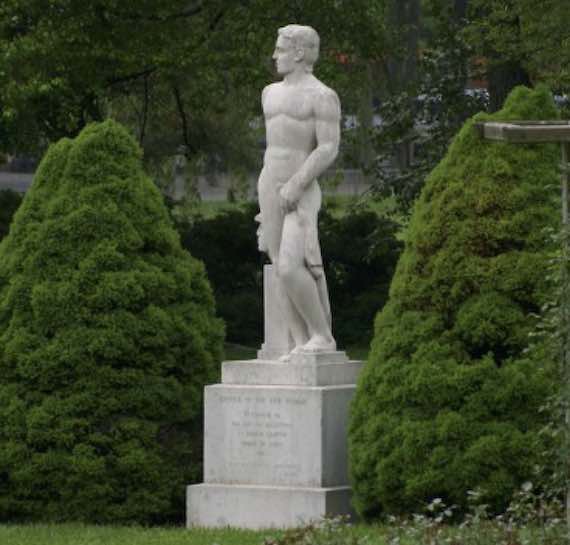
"Greece in the New World" Sculpture
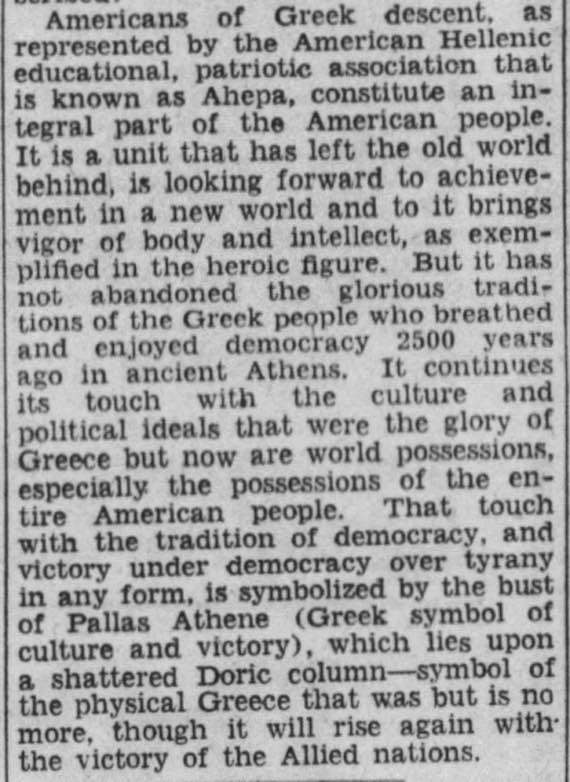
The Morning Call (Allentown, PA) April 10, 1942
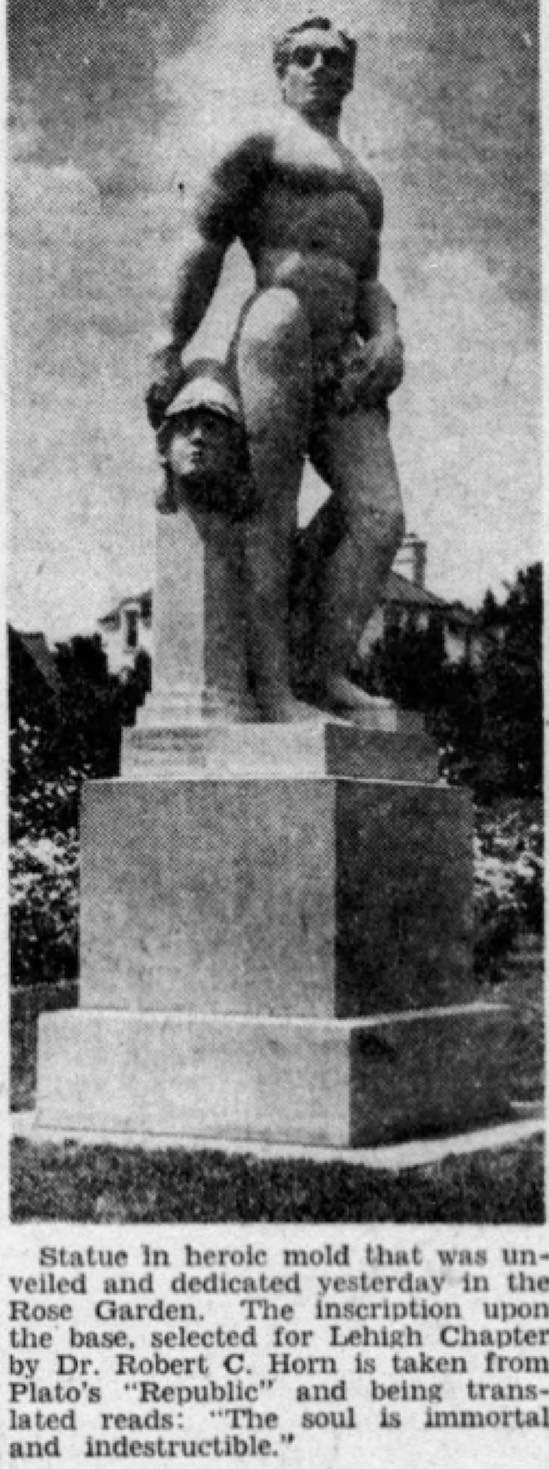
"Greece in the New World" Unveiling
The Morning Call (Allentown, PA) June 28, 1943

Dedications
The Morning Call (Allentown, PA) June 28, 1943
… The pages of the Ahepan magazine are filled with articles and photos of members of the Ahepa Family in the U.S. armed forces.
Electra Bilmazes of Haverhill, Massachusetts was awarded first prize in the National High School Essay Contest sponsored by the War Writers Board. The 17 year old girl received a $500 War Bond as her prize … "Death Stalks Greece" is the subject of a chilling article in the Ahepan magazine describing the horrors of famine in Greece … King George II of Greece visits the United States and the Ahepa tenders him a dinner in New York City, at the Hotel Astor … Muskegon, Michigan chapter donates $1,029 to the American Red Cross, as the drive intensifies.
The Nineteenth Supreme Convention
September 13 to 19, 1942 - Atlanta, Georgia
The 19th Supreme Convention was held in Atlanta, Georgia, during the week of September 13-19, 1942. This was Ahepa's 20th anniversary year, and the convention was held in the fraternity's founding city. Convention officers elected were: Harris J. Booras, Chairman; Peter T. Kourides, Vice Chairman; Peter Bell, Secretary.
National and District delegates were:
Supreme Lodge: Van A. Nomikos, George C. Vournas, Charles Davis Kotsilibas, Stephen Scopas, George E. Loucas, George Kisciras, and Tom Semos.
Mother Lodge: Nicholas D. Chotas, John Angelopoulos, James Campbell, P. J. Stamos, Harry Angelopoulos, George Campbell, George A. Polos, James Vlass.
Past Supreme Presidents: V. I. Chebithes, Harris J. Booras, George E. Phillies, Achilles Catsonis.
District Governors: Gus Gulas, Peter N. Chumbris, Peter A. Adams, Nicholas Jamieson, William Andreas, Basil S. Milonas, Basil A. Joannides, Thomas Phillips, Perry E. Gioumpakes, Nick C. Giovan, Nick G. Peet, Gregory Panopoulos, Angelo J. Manousos.
There were also 129 Chapter delegates at the convention.
Convention mandates included:
(1) Passed resolutions of appreciation to the governments of the United States, Great Britain, Canada, and Sweden, for furnishing food, clothing and medical supplies to the people of Greece;
(2) To inaugurate a drive to collect funds for the establishment of a home for children of Greece, as well as endeavour to place such orphans in various homes in the United States, to be brought from Greece as soon as, and in as large numbers as, possible, and that if this plan is adopted and successfully carried out, several units can be established for these children in various locations in this country.
Page 337
In addition, the convention voted to suspend the holding of Supreme Conventions for the duration of the war, and also passed a resolution pledging solemn support of the government of the United States in every phase of the war effort, including a donation of $650 for radio broadcasts requested by the U.S. Government Office of Facts and Figures; that all Ahepa Chapters invest at least 10% of their treasuries in U.S. Defense Bonds; continue full support of the Greek War Relief Association; thanked the movie industry for its support of Greek War Relief. Since the convention voted to suspend Supreme Conventions for the duration of the war, it was decided that the convention elect a Supreme Lodge for the ensuing year, and "that for the duration of the emergency the powers now exercised by this Supreme Convention shall be vested in a conference composed of the Supreme Lodge, the Past Supreme Presidents, and the District Governors, which shall convene in Washington, D.C. on the third Monday of August as provided for in the Constitution."
This action gave the forthcoming conference to be held in Washington, D.C., the full powers of a Supreme Convention.
Supreme Lodge officers elected by the 1942 Atlanta Supreme Convention were: George C. Vournas, Supreme President; Charles Davis Kotsilibas, Supreme Vice President; Stephen Scopas, Supreme Secretary; John F. Davis, Supreme Treasurer; Leo Lamberson, Supreme Counsellor; William A. Vasiliou, Supreme Governor; Constantine J. Critzas, Supreme Governor.
The Atlanta Journal of September 15, 1942, said this of the Ahepa convention:
Atlanta is highly honored in having as a guest the 20th annual convention of the national American Greek Order of Ahepa, … including representatives of such allied groups as the Daughters of Penelope, Maids of Athens, and Sons of Pericles. These organizations stand for the best both in Greek tradition and in American citizenship.
It may truly be said that the more faithful their members are to the historic ideals of their motherland, the more loyal they will be to our own democracy; for it was Greece that first taught the world the glory of human freedom. Though she is now in bondage for a season to barbaric aggressors, her ancient spirit lives as unconquerably as in the shining days of Plataea and Marathon. The United States and the United Nations are proud of such an ally. Americans know well the value of their fellow citizens and friends from Greece. And Atlanta's welcome to the present convention is the more cordial because of the public-spirited Greeks dwelling in her midst.
Page 338
On October 28, 1942, a coast-to-coast radio broadcast over The Blue Network launched the American Hellenic $50,000,000 War Bond Drive, sponsored by the Order of Ahepa October 28, 1942 was the second anniversary of the Italian attack against Greece, and the broadcast included U.S. Representative Sam Rayburn, Speaker of the House of Representatives, Supreme President George C. Vournas, Gary Cooper, Greek actress Katina Paxinou, and Greek baritone Nicola Moscona.
It was also announced that the Order of Ahepa had been named as an official Issuing Agent for U.S. War Bonds, by the U.S. Treasury Department, an honor achieved by no other civic organization, insofar as records show. Quotas were assigned to all Ahepa Districts for the final goal of $50,000,000 to be reached by the Ahepa in War Bond Sales within the four months (October 28, 1942 to Feb. 22, 1943).
The Ahepa drive for War Bond sales started simultaneously throughout the country, and one of the first sights to greet those who passed in front of the White House was the familiar face of Steve Vasilakos, beside his peanut cart.
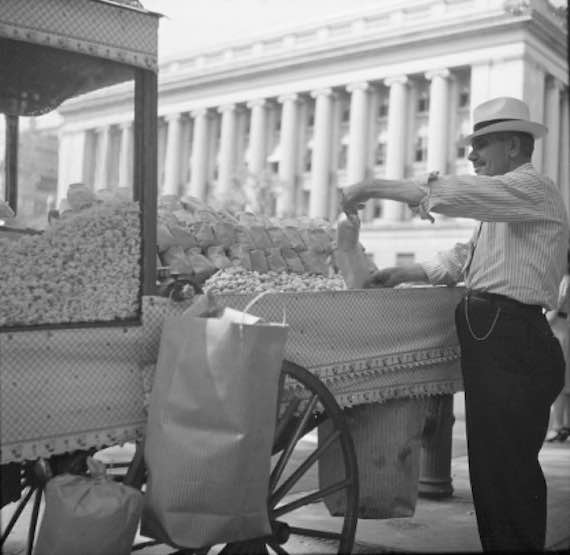
Steve Vasilakos
Steve Vasilakos was dubbed "AHEPA's No. 1 War Bond Salesman" for his cart now proudly displayed a sign which read: "Peanuts Free with Every Bond Bought Here to Help Steve Vasilakos War Bond Effort, Mobilized in AHEPA 'S $50,000,000 Drive, October 28, 1942 to February 22, 1943." Steve's first customer was Speaker of the House of Representatives Sam Rayburn.
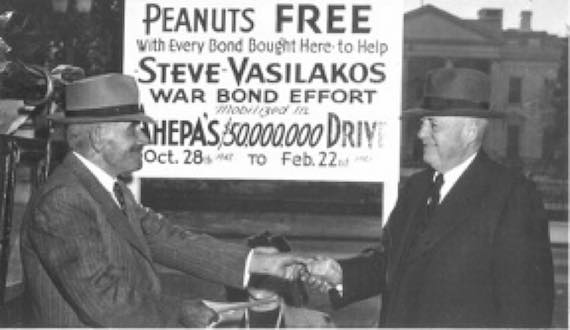
Steve Vasilakos & House Speaker Sam Rayburn
1942 - Inauguration of the first Ahepa War Bond Drive. U. S. Speaker of the House of Representatives Sam Rayburn buys the first War Bond from the Ahepa, from Steve Vasilakos, in front of the White House.
[ Read more about Steve Vasilakos, the White House's Peanut Man ]
Ahepa members who were not serving in the armed forces for reasons of age or health, rallied 100% behind the Ahepa War Bond Drive. Buffalo, N. Y. sold $81,000 the first day; Shreveport, La. $40,000 the first day; Tucson, Arizona $60,000 by Nov. 25th; Washington, D.C. Ahepans with business firms gave their full day's receipts to the Bond Drive; two thousand people at the Detroit, Mich. Victory Ball purchased $200,000 in bonds that night; Las Vegas Ahepans placed newspaper ads giving the names of restaurants where complimentary dinners would be served to customers buying War Bonds; Birmingham, Alabama sold $58,000 in Bonds in 15 days.
The lists of members of the Sons of Pericles, and the Order of Ahepa, now serving in the armed forces, seems to grow endlessly, and the Junior Order begins to show the effects of its thinning ranks, with practically all members between the ages of 17 and 21 now in the services. Only the 14 to 16 or 17 year old members are left behind to maintain the Sons of Pericles chapters.
The American Red Cross, at Ahepa 's suggestion, designates March 25, 1943 as "Greek Day" in recognition of the valiant fight that Greece made against Italy and Germany, and Ahepa chapters made special drives that day in collecting and contributing to the Red Cross. Supreme President George C. Vournas extends the Ahepa War Bond Drive to May 21, 1943, and said:
"The War Bond Drive came at a time when our people were thirsty for some form of collective action connected with the prosecution of the war. Now we have it. The opportunity to display our patriotic colors is here. We must not fail to grasp it and thereby point the way to all our co-citizens not wearing the uniform and thereby maintain the proper morale on the home front which will inevitably lead to quick and certain victory."
(Continued on page 340)
Page 339
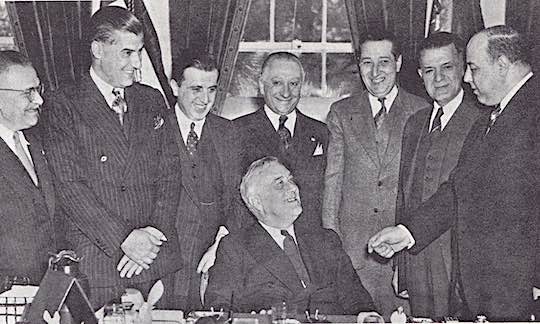
1941 - WHITE HOUSE VISIT
With President Franklin D. Roosevelt are: Charles N. Diamond, George C. Vournas, Peter T. Kourides, Charles Davis Kotsilibas, Daniel Pananicles, George Kisciras, Van A. Nomikos
Page 340
(Continued from page 338)
In connection with the War Bond drive, Supreme President Vournas began a long tour of more than a month of Ahepa Chapters; Past Supreme President Christ J. Petrow of the Sons of Pericles, now an Ensign in the United States Navy, was given detached special duty by the Navy Department to visit 35 cities with Ahepa Chapters, to coordinate Ahepa efforts in the drive. The U.S. government was so impressed with the first results of Ahepa's drive, achieved by written correspondence from Ahepa Headquarters alone, that it saw fit to assign Ensign Petrow to this special duty.
The U.S. Treasury Department, which gave the Order of Ahepa the special privileges of selling War Savings Bonds, issued the following certificate to the fraternity:
SUPREME LODGE ORDER OF AHEPA
WASHINGTON, DISTRICT OF COLUMBIA
Is a duly authorized agent of the United States Treasury Department for the issuance of War Savings Bonds.
The service rendered as issuing agent is performed as a patriotic contribution to the Nation's War Effort, and without compensation in any form from the Government of the United States of America.
Henry Morgenthau, Jr., Secretary of the Treasury
Countersigned:
Federal Reserve Bank of Richmond Fiscal Agent of the United States Hugh Leach, President
Throughout the country, local newspaper articles and headlines read:
AHEPA PUSHES BONDS DRIVE -- RAYBURN BUYS BOND TO OPEN AHEPA CAMPAIGN -- GREEK-AMERICANS BUY $50,000 IN WAR BONDS -- BOND SALE GOAL IS FIXED AT $225,000 -- AHEPA EXCEEDS WAR BOND QUOTA -- SET $230,000 GOAL FOR BONDS -- BUY A BOND AND EAT ON GEORGE -- AHEPA CHAPTER JOINS RANKS OF TREASURY AGENTS -- AHEPA RALLY YIELDS $200,000 FOR WAR BONDS -- VOURNAS VISIT SPURS SALE OF BONDS -- AHEPA PRAISED FOR BOND SALES -- AHEPA COMMITTEE SETS UP BOND BOOTH AT BANK -- $35,000 IS SOLD AT VICTORY BALL -- SHATTER WAR BOND RECORDS -- AHEPA 'S GOAL $85,000 – AHEPA UNIT OPENS BOND, STAMP DRIVE -- GREEKS EAGER TO BEAT BOND GOAL AND ENEMY -- SHREVEPORT CHAPTER HAS QUOTA OF $120,000 -- $150,000 SOUGHT IN WAR BOND PURCHASES.
One newspaper article began:
"It's unusual to find any of the city's Greek merchants in their business establishments these days. The reason -- they are busy selling War Bonds for Uncle Sam."
Page 341
"The War President"
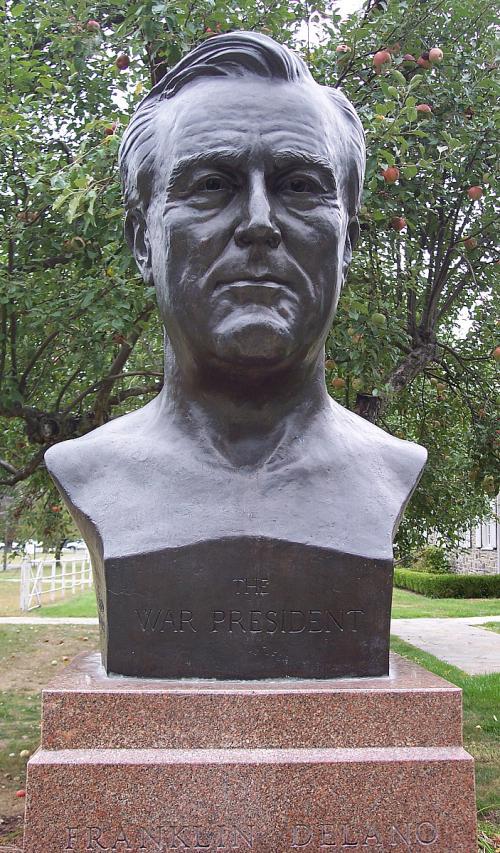
The "War President"
The "War President" bust commissioned by AHEPA in honor of FDR at the Franklin D. Roosevelt Presidential Library in Hyde Park, New York
A heroic bronze front-facing head and shoulders The "War President" bust of President Franklin D. Roosevelt, by sculptor Walter Russell, presented by the Ahepa to the nation.
Inscribed at the front of the base of the bust is the title of the piece: "THE WAR PRESIDENT"
The bust is mounted on a pedestal of polished red granite. The pedestal tapers from a base 25" across by 22" deep to a top platform that is 21" across by 18" deep.
Inscribed on the pedestal front: FRANKLIN DELANO ROOSEVELT PRESIDENT OF THE UNITED STATES 1933 - 1945.
Inscribed at the bottom of the pedestal at the front: PRESENTED BY THE ORDER OF AHEPA 1945.
There are two bronze plaques fixed to the reverse of the pedestal.
The top plaque reads: FRANKLIN D. ROOSEVELT BY WALTER RUSSELL PRESENTED TO THE FRANKLIN D. ROOSEVELT LIBRARY BY THE ORDER OF AHEPA ON MARCH 10, 1943.
The plaque at the bottom reads: FRANKLIN DELANO ROOSEVELT WAS INITIATED IN THE ORDER OF AHEPA ON MARCH 11, 1931 AND MAINTAINED MEMBERSHIP IN DELPHI CHAPTER NO. 25 OF NEW YORK CITY TO THE DATE OF HIS DEATH.
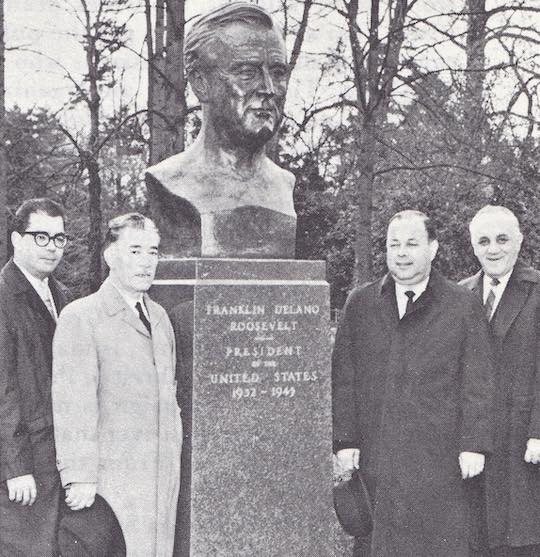
The Ahepa "War President" Bust Dedication
On October 28, 1945, the Order of AHEPA dedicates the "War President" Bust in the garden of the
Franklin D. Roosevelt Library in Hyde Park, New York.
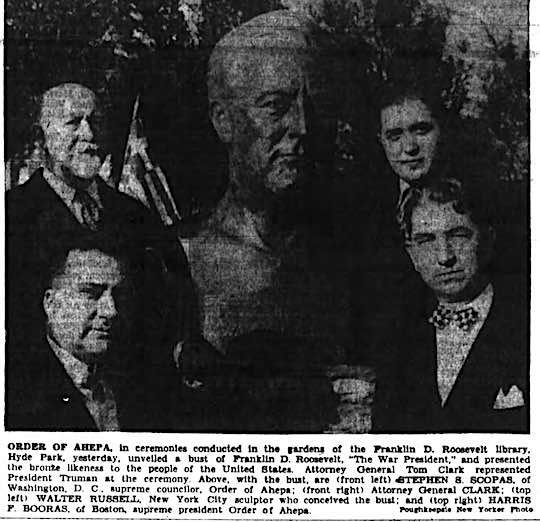
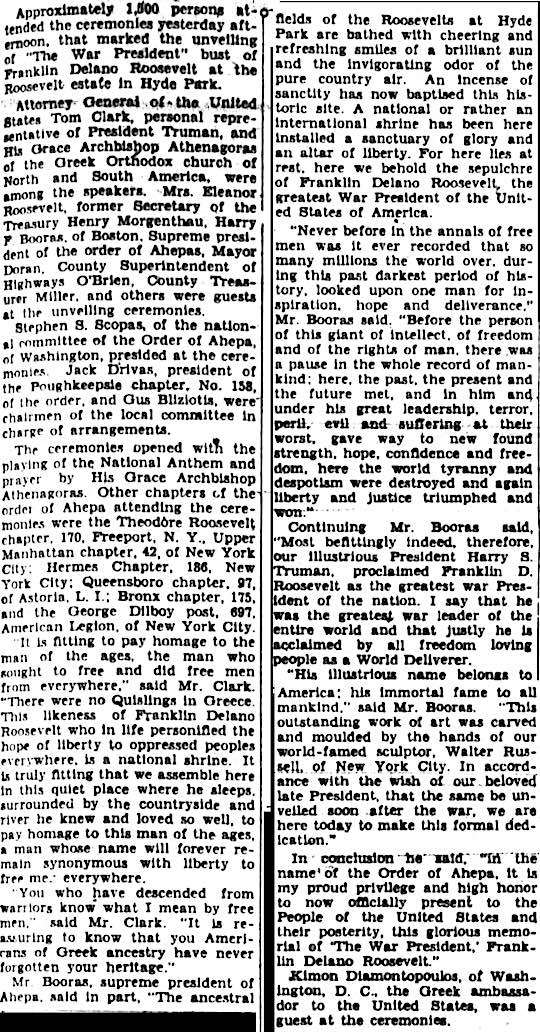
The Ahepa "War President" Bust Dedication
Poughkeepsie Journal (Poughkeepsie, New York) Monday, October 29, 1945
Page 342
Drew Pearsons Merry-Go-Round column stated:
When news reels showed Speaker Sam Rayburn buying a bond from Steve Vasilakos, the Greek peanut vendor at the White House, it was Sam and Steve who got the publicity but it was a very significant group of American citizens who planned the thing -- The Order of Ahepa. The Ahepa is an organization of Americans of Greek descent. And although most Americans of foreign descent have been patriotic, those from Greece, a country which has suffered probably more than any other, have been intensely so. Ahepa was among the first to lead the crusade for naturalization among immigrants. It was also the first national organization to denounce persecution of the Jews by Hitler, and among the first to urge universal military service.
At present, Ahepa is staging a nationwide drive to raise 50 million dollars in war bonds from Greek-Americans. Ahepa's progressive president, George Vournas, is making a tour of the country pushing the sale, while Ensign Christ J. Petrow, U.S.N.R., is making a simultaneous tour. The campaign is not only to sell bonds hut to make pepple realize more than ever that this is "our" war and its financing "our" problem."
… (From the Washington Merry-Go-Round by Drew Pearson).
In March, 1943, the Ahepa Supreme Lodge visited President Franklin D. Roosevelt, for the purpose of presenting a bust by sculptor Walter Russell of "The War President." This was an heroic size bust of President Franklin D. Roosevelt.
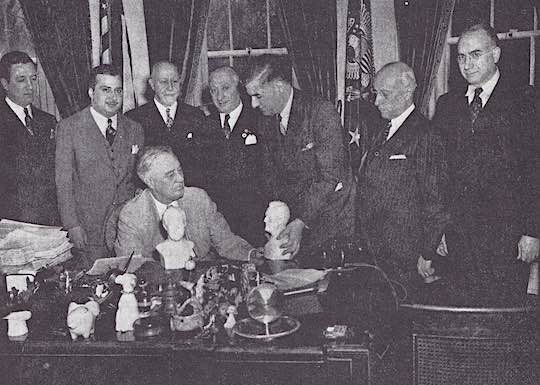
AHEPA "War President" Replica Bust
Ahepa Supreme Lodge presents small replica of Roosevelt's "War President" bust to President Roosevelt (member of
AHEPA) at the White House on March 10, 1943
Again, in his "Washington Merry-Go-Round" columnist Drew Pearson wrote on March 24, 1943:
When the Greek-American Order of Ahepa presented the President with a huge stone bust of himself, Walter Russell, the sculptor, inquired if the President had any suggestions regarding the position of the bust in front of the Roosevelt Library at Hyde Park, where it is to be installed. 'That's out of my hands,' the President grinned. 'You'll have to take it up with the librarian or the trustees. The library is no longer my property. It belongs to the American people.'
However, the President had some definite notions about when the bust should he unveiled. When George C. Vournas, President of Ahepa, said that the unveiling would he postponed until this summer, Roosevelt heartily agreed, 'If you've ever been to Hyde Park in the winter, you'll understand why,' he remarked, 'I almost froze to death the last time I was there.'
Since the bust is of heroic size and weighs half a ton, it was not practical to bring it to Washington from Russell's studio in New York. So, the President was given, instead, a miniature of the work. After presenting this, Vournas introduced six other Ahepa officials, who were greatly impressed by the President's memory. 'You gentlemen were in the delegation from Ahepa which called on me last year,' he said. 'I remember you all quite well.' When the question arose of transporting the bust from New York to Hyde Park, the President remarked that this could be arranged easily. 'The librarian is planning to come to New York soon,' he said, 'to pick up some documents. He can bring down the truck and get the bust at the same time. That will save gas.' Note: The President has been an active member of the Order of Ahepa since he was Governor of New York in 1928. He pays $9 a year dues."
-- From the Washington-Merry-Go-Round by Drew Pearson.
Page 343
Members of the Supreme Lodge who visited President Roosevelt on that occasion were: George C. Vournas, Charles Davis Kotsilibas, Stephen S. Scopas, John F. Davis, Constantine J. Critzas, Vasilios A. Vasiliou. Leo J. Lamberson was unable to attend.
In making the presentation, Supreme President Vournas said to the President:
From time immemorial, it has been the custom of the people of Greece to erect figures of stone to their great men, not only to honor them for their noble deeds, but also to invite emulation by posterity. This posterity now embraces all nations cherishing the ideals of Democracy nurtured in that little country more than two thousand years ago and carried to the four corners of the earth by her ever pioneering sons. Today the ancient role of Greece is played on a far larger scale by a great Union of free States, this mighty Republic, led by the Century's most practical idealist; the man who was able to convert lofty human visions into human tasks, to awaken a World Conscience among men and to mold ideals into a fighting and winning force. Mr. President, on behalf of the Ahepa, an organization founded by Americans of Hellenic ancestry and dedicated to the cause of fortifying the ideals of American Democracy -- on behalf of the very spirit of our Hellenic heritage -- I have the honor to present this Bust, through you, to our fellow Americans -- that future generations may have a visual concept of Franklin Delano Roosevelt, the Commander-in-Chief of America's greater mission and one of mankind's noblest sons.
Walter Russell, the sculptor, studied President Roosevelt for six years to produce this bust. He executed a bust of the President several years earlier, the first to be accepted and approved by his entire family, which showed him in the light of the Country Gentleman. Even as he was contemplating the new bust, Russell discerned changes in the President, and then decided to attempt to catch those spiritual changes that were slowly turning the Country Gentleman into "The War President."
The President readily approved of the bust, with the stipulation that it could not be presented by any one person, or any group, against whom there might be the slightest suspicion of having the proverbial "axe to grind." Several groups that wanted to present the bust were turned down, but the Order of Ahepa was accepted as a proper and fitting sponsor and donor.
Des Moines, Iowa and Newark, New Jersey Ahepa chapters were the first to go over the 1 million mark in War Bond sales and were cited for their accomplishments … Shreveport, La. went four times over its assigned quota of sales, and was honored by having a bomber named after the Ahepa and the city of Shreveport … Gus Maggos, Alton, Illinois, and Michael Loris, Brooklyn, each had individually sold more than 1/2 million in bonds .
Page 344
Besides Des Moines and Newark, who had quotas of $250,000 and $300,000 respectively, and had sold $1,217,000 and $2,500.000 respectively, the following Chapters all had surpassed their quotas before March 1st: Detroit, Cleveland, St. Louis, Brooklyn, Portland, Oregon, Moline, Shreveport, Houston, Alton, Illinois, Minneapolis, Hartford, Peoria, Atlanta, Rockford, Illinois, Rochester, N.Y., Birmingham, Tucson, Dayton, Harrisburg, St. Paul, Keene, N.H., Charleston, Vallejo, Cal., Aberdeen, South Dakota, Las Vegas, Middletown, Springfield, Ohio, South Bend, Texarkana, Texas, Pontiac, Mich., Lewiston, Me., Glens Falls, N. Y … Moline, Illinois, member Charles Bookidis gave away 33,826 of his Ucanco Candy Co., candy bars to those who bought War Bonds … Chapters throughout the country began receiving citations and letters of commendation from U.S. Treasury Department officials for their War Bond sales.
The Atlanta, Saint Louis and Hartford Ahepa chapters on American Red Cross "Greek Day" campaign with contributions of $4,000; $2,600; and $1,300 respectively … Washington, D.C. raises $6,400 … Cleveland $2,762 … Huntington, W. Va. $887 … Tucson $1,178 … Baltimore $2,500 … Bridgeport, Conn. $2,050 … Wilmington $1,139 … Las Vegas $1,061 … Schenectady $1,000 … Norfolk $1,035 … Albany $825 … Chester, Pennsylvania $642 … Saginaw $928 … Asbury Park, N.J. $645.
Two State Governors join the Ahepa … Governor Poletti of New York, and Governor Dwight H. Green of Illinois … Pete Androutsos of Zanesville, Ohio chapter sells $44,566 in War Bonds in one day … Vancouver, Canada Greek business men gave their total day's receipts on March 25 to the Canadian Red Cross, a total of $7,301. … Uniontown, Pennsylvania Greek business men gave their receipts of $861. … The Ahepa drive ended on May 21, 1943 with the goal of $50 million in War Bonds Sales oversubscribed.
Ahepa announces that Ahepa War Bonds sales will continue for the duration of the war … and sets a goal for the 1 year period of July 1, 1943 to July 1, 1944 … Assistant Secretary of the Treasury John L. Sullivan congratulates and commends Gus Maggos of Alton, Illinois, Chapter and Charles Bookidis of Moline, Illinois chapter for their individual War Bond sales. Maggos had reached individual total sales on May 21, 1943, of $3,279,000 and Bookidis individual sales of $1,243,500 by the same date … By then, Supreme President George C. Vournas had been commissioned Captain in the U.S. Army … Others commended for their War Bond sales were Michael Loris of Brooklyn, who sold $1,320,000, mostly in bonds of small denomination; Gus Martin, Des Moines, Ia., who sold $1,378,026; James J. Starr of Hartford, Conn., who sold $525,000 … District No. 13 oversubscribed its quota by selling $9,309,775 with $1,700,000 sold on one evening at the Trianon Ballroom, Chicago, at a War Bond rally attended by 8,000 people … Nick Sarakatsannis, Cincinnati, sold $3 million by 1946.
Page 345
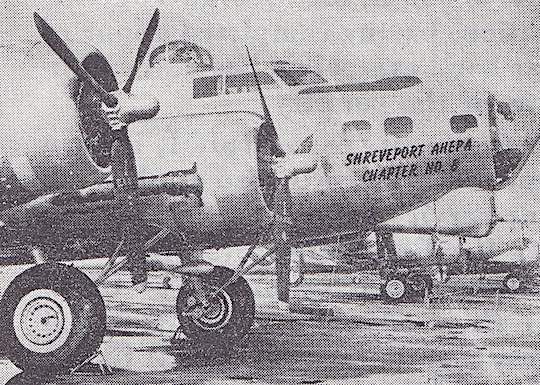
AHEPA Chapter #8 Shreveport Bomber
1944 - American bomber named after Shreveport, Louisiana Ahepa chapter for sale of War Bonds.
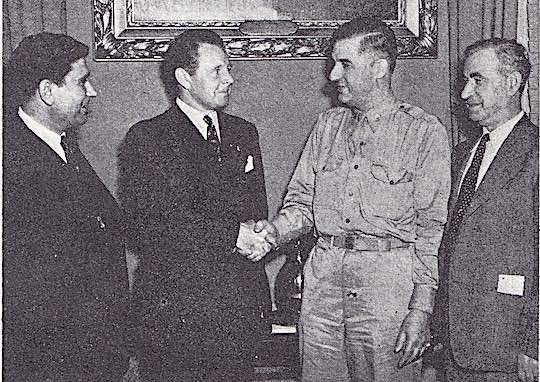
War Bond Sales
1943 - Gus Maggos and Charles Bookidis visit Assistant Secretary of Treasury John L. Sullivan with Supreme President Vournas to be congratulated on War Bond sales
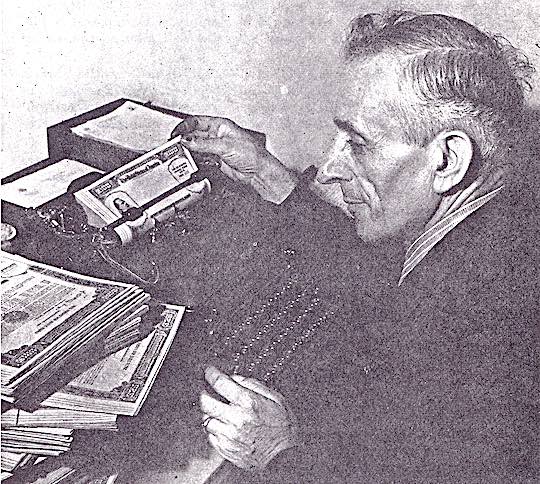
Michael Loris of Brooklyn
1943 - Michael Loris of Brooklyn, New York #41, named U. S. champion War Bond salesman for sale of 24,142 individual bonds during 12-month period
Page 346
United States Senator Scott W. Lucas of Illinois said:
"Under the leadership of the great Greek-American national organization Ahepa, which is dedicated to good Americanism, the American citizens of Greek descent have sold nearly $50,000,000 worth of War bonds. Mr. George Vournas, the Supreme President of the organization, having completed a tour of the country in connection with the War bond campaign, has now volunteered his services to the armed forces of the country."
The Ahepa War Bond sales goal for the fiscal year of July 1, 1943 to June 30, 1944 is set at $100,000,000, and the fraternity also established its War Service Units. The Ahepa War Service Units were established to carry out the following activities:
(1) War Bond selling, (2) American Red Cross campaign, (3) Greek War Relief and National War Chest Campaigns, (4) Civilian Defense, (5) Blood donations, (6) Hospital visitations, (7) Preparation of Red Cross Supplies …
National Chairman Norman H. Davis of the American Red Cross salutes Ahepa: "We are very gratified for the splendid support given to the Red Cross by our American citizens of Greek origin. The Order of Ahepa through its members contributed notably to the success of "Greek Day" during our drive. We are deeply grateful. You should he justly proud of your record." ... Other notable Chapter contributions to Red Cross "Greek Day" were Miami $1,622; Anderson, Ind. $739; Cedar Rapids, la. $800; Pocatello, Idaho $487; Kalamazoo, Mich. $500; Dubuque, Ia. $1,304; Manchester, N.H. $6,000; Lowell, Mass. $1,094 … U.S. Destroyer Escort ship U.S.S. Bebas was named in memory of Ensign Gus Bebas, Wilmette, Ill., who lost his life while serving as a pilot on the carrier Hornet.
Governor Sam Houston Jones of Louisiana joins the Shreveport, La. Ahepa chapter … Ahepa rolls begin to record the deaths of Ahepans and Sons of Periclee who gave their lives in the service of their country … The 5,000,000th bushel of wheat is shipped to Greece by the Greek War Relief.
Secretary of the Treasury Henry Morgenthau, Jr., congratulates Ahepa:
May I extend to you and your War Bond Committees, and the officers and members of your chapters, sincere congratulations for the successful conclusion of the Ahepa War Bond Drive. Your chapters and the War Bond Committees ought to be proud of having oversubscribed your $50,000,000 goal. Please convey my congratulations and best wishes to all the Ahepa Chapters. Your Government appreciates your patriotic services and your contribution to the war effort. I know that in the new campaign for $100,000,000, which your fraternity is sponsoring, you will again do your full duty as good Americans, and distinguish yourselves in the service of your country.
Page 347
The 1943 National Conference
August 16 to 17, 1943 - Washington, D.C.
A National Conference, in lieu of the normal Supreme Convention as mandated by the 1942 Supreme Convention in Atlanta, due to World War II, was held in Washington, D.C. for two days, August 16 and 17, 1943. Attending the Conference were:
Acting Supreme President Charles Davis Kotsilibas ( the Supreme Vice President who held the office of Supreme President in the absence of Supreme President George C. Vournas who was on military duty in North Africa); Supreme Secretary Stephen S. Scopas, Supreme Treasurer John F. Davis, Supreme Counsellor Leo J. Lamberson, Supreme Governor Constantine J. Critzas, Supreme Governor Vasilios A. Vasiliou
Past Supreme Presidents Harris J. Booras, V. I. Chebithes, Van A. Nomikos, and Achilles Catsonis, and the following District Governors: Constantine T. Gulas, Peter N. Chumbris, Thomas P. Birris, John A. Givas, Nicholas Jamieson, William Andreas, Basil S. Milonas, Basil A. Joannides, Thomas Phillips, George T. Poolitsan, Peter A. Michaels, Nicholas C. Giovan, P. L. George, Anthony Condos, Dean Soles, Angelo J. Manousos.
The following were elected as officers of the Conference:
Constantine T. Gulas, Chairman; Angelo J. Manousos, Vice Chairman; C. B. Johannides, Secretary. Brother C. B. Johannides was Executive Secretary of the fraternity, and acted as Secretary of the conference, although he was not a member of the Conference.
On the question of the status of the Supreme Lodge, the Conference affirmed the ruling of the Supreme Counsellor that the Supreme Lodge elected at the 1942 convention would serve in office for the "duration," and until the next regular Supreme Convention of the Order. The term "duration" was then defined to mean "until the day of the cessation of hostilities in the European theatre of war." It was further stated that the suspension of annual conventions had been necessary and proper because of the transportation problem, travel regulations, hotel accommodations, and a desire to help the war effort of the country were uppermost in the minds of the delegates of the 1942 Atlanta convention.
It was further decided by ruling that the limited powers of the Conference would be those powers which were not of a legislative nature and which do not change or amend any of the provisions of the Constitution and by-laws of the Order or any of its convention mandates. It was ruled that the Conference had the right and power to set the annual Budget of the fraternity, establish war emergency projects, hold membership drives, and pass upon resolutions for the good of the Order and the promotion of the welfare of the fraternity.
The Conference then voted the budget for the following year, and acted upon plans for the program of the War Service Units of the fraternity.
The Ahepan magazine carried a photo of Captain George C. Vournas, U.S. Army, Ahepa Supreme President; Lt. (j.g.) Christ J. Petrow, USNR, Past Supreme President of the Sons of Pericles; Lt. Col. James Basbas of Manchester, N.H.; and Lt. (j.g.) Nick Conteas, USNR, of Waukegan, Ill., all on duty in Egypt.
Page 348
Gus Maggos of Alton, Ill., had achieved an amazing total in War Bond sales of $8,500,000 by September, 1943. The original quota for his chapter was $100,000 and the chapter, with Brother Maggos' individual sales, had surpassed $9,000,000. Brother Maggos was also appointed as Chairman of Ahepa 's National Board of Coordinators, and Van A. Nomikos was made Vice Chairman of this board, with John G. Carzis of Boston as Vice Chairman … Charles Bookidis, national treasurer of the Ahepa War Service Units, received a call from his Chamber of Commerce in the quad-city Moline, Illinois area that War Bond sales were falling off. This happened Sept. 10th, and Sept. 25th was declared Ahepa Bond Day. Bookidis ran ads offering free candy for war bond purchases, and 100 booths were set up on the day with a result of $2,329,275 in bonds sold that Sept. 25th.
Chairman A. W. Nilsson of the Casper, Wyoming City War Bond Sales Committee said: "Today, all chapters of the Order of Ahepa, national in scope, have received orders that their sponsorship of bond selling through their own issuing agencies, is to be continued for the duration. We salute our Greek allies. Certainly, we can have no greater inspiration to spur us to do our best than to take example from our good friends and neighbors of Greek parentage." ... There's the story of the young girl who brought a paper bag to Nicholas Paris, chairman of the Rochester, N.Y. drive, with $2,300 in small bills, sent by her father to purchase war bonds.
Michael Loris of the Brooklyn Chapter was cited for selling 24,142 individual war bonds, totaling $3,050,000, a task that took him 12 months of solid work, and cost him 38 pounds in weight, and 22,000 of the bonds he sold were $100 or less face value … James J. Starr of Hartford, Conn., was cited for selling $3,270,000 in bonds … Las Vegas chapter entertained more than 1,500 soldiers at the local USO club, and also distributed free meal tickets to soldiers through the USO ... This Week, magazine supplement of Sunday newspapers, carried a story about Mike Louis, chairman of the city's Ahepa war bond drive, and his Soda Shop: "But then the boys (customers) began to go to war. ... And they began writing back to Mike and Mike would pass their letters among the crowd. Then he would answer the letters, telling the boys all about the other fellows and the gang. When it got to be more than a one-man job, he pressed girl customers into service, and began dictating to them as they sipped their sodas. The girls often added their own messages. One letter to Africa had 70 contributors. And all the boys get a gift from Mike and the crowd at Christmas. More than a year ago, Mike stripped the cardboard signs and candy boxes out of his window and filled it with photographs of the boys in uniform. A service flag which the crowd chipped in to buy has 170 stars. Boys home on furlough made a beeline for Mike's. There Mike sets before them -- on the house -- banana royals such as were never seen elsewhere on earth. They get a complete load of news. And it is an unwritten rule among the gang at Mike's that a boy on furlough has a date with any girl friend he wants to see, even if it means she has to stand up a civilian boy friend."
The American Red Cross again set March 25 as "Greek Day" in 1943 … The Chicago Sun paid tribute to Ahepan Frank E. Pofanti of Chicago: "Today the Chicago Sun salutes Frank E. Pofanti, who recently was cited by the Treasury Department for his share in raising $40,000,000 for a new cruiser through war bond sales." ... Nick Jameson of Grand Island, Nebraska, is appointed a national coordinator for the Ahepa War Service Units.
Page 349
The Miami AHEPA chapter collected more than 55,000 items of clothing to be sent to Greece … May 21, 1944 was designated "I Am an American Day" by President Roosevelt. ... The Order of Ahepa finally purchases its own National Home, an Ahepa Building in Washington, D.C. at 1420 K Street, N.W., adjacent to the Ambassador Hotel in downtown Washington. It was a five-story building. The Commiteee in charge of finding a building for purchase was composed of Supreme Treasurer John F. Davis, Supreme Vice President Charles Davis Kotsilibas, and Supreme Governor Constantine J. Critzas ... Supreme President Vournas, now a Major in the U.S. Army is given special duty by the Army to the Treasury Department and sent on a tour of the country to promote War Bond sales … Mike E. George of Waterloo, la., sold $688,000 in war bonds through his real estate office.
The 1944 National Conference
August 21 to 22, 1944 - Washington, D.C.
The second National Conference of the Ahepa was held in Washington, D.C. on August 21-22, 1944. Attending were: Supreme President George C. Vournas, Charles Davis Kotsilibas, Supreme Vice President; Stephen S. Scopas, Supreme Secretary; John F. Davis, Supreme Treasurer; Leo J. Lamberson, Supreme Counsellor; Tom Semos, Supreme Governor. (Tom Semos was elected Supreme Governor by the Supreme Lodge due to the prolonged absence from the country of Supreme Governor Constantine J. Critzas.)
Past Supreme Presidents: V. I. Chebithes, George E. Phillies, Harris J. Booras, Achilles Catsonis, Van A. Nomikos.
District Governors: George Cotsakis, Archie Zapetis, Peter N. Chumbris, Dr. Aris Carpousis, John Thevos, George L. Bourney, George K. Demopulos, Basil S. Milonas, Basil A. Joannides, Tom State, A. G. Davis, George Geroulis, Nicholas C. Giovan, Tom Siamis, Michael D. Konomos, Anthony Condos, Ben Anattol, Dean Soles, William Panagos, Steve Anastos.
Officers elected for the conference proceedings were: Nicholas C. Giovan, Chairman; Basil A. Joannides, Vice Chairman, and C. B. Johannides (Executive Secretary), Secretary to the conference.
The work of the Conference consisted of approving a budget, approved the Ahepa War Service Units program with its component parts, the Ahepa War Bond Drive, the American Red Cross Drive, the Greek War Relief Association Drives, the National War Chest Fund, blood donor campaigns, and recommended that these activities be intensified during the coming year. The Conference also approved a plan calling for the establishment of a Scientific and Historical Research Bureau under the Ahepa War Service Units, whose purpose would be the collecting and disseminating of scientific information helpful to the cause of Greece and the Greek people.
Page 350
Among resolutions passed were:
That immediately following declaration of peace, the Ahepa schedule a series of excursions to Greece so that members with families in Greece be able to visit that country; That the Supreme Lodge take steps to secure from the U.S. Government permission for orphan children of Greece to enter the United States, and that a survey be taken of the fraternity to find sponsors for these children for adoption; That Greece be selected as the initial and first member from smaller nations to the Council of Nations; That an expression of thanks be given to Senator Pepper of Florida for his support of the return of the Dodecanese Islands to Greece; That $1,000 be donated to Pomfret Theological School, and $500 to the West Palm Beach chapter for the three Greek orphans sponsored by the chapter. The conference adjourned with the incumbent Supreme Lodge serving until the next conference or Supreme Convention, depending on the status of the war.
By the end of July, 1944, the Ahepa War Bond Drive sales had reached $162,012,287.25, which was $12,000,000 over the goal of $150,000,000 set by the Supreme Lodge for the first 21 months of the two combined drives ($50 million, and $100 million in two separate drives.) District No. 13 (Illinois, Wisconsin, and St. Louis, Mo.) led all 24 districts with an amazing $66,543,825 total. District No. 6 (New York State) was second in total sales with $17,352,870. The next closest was District No. 11 (Ohio, Kentucky, and part of West Virginia) with $7,194,808 … Ahepa is again congratulated by the U.S. Treasury Department in August, 1944, for its continuing war bond sales … Gust Maggos, Ahepa national war bond chairman, is congratulated by the U.S. Treasury for his remarkable feat in bond sales and securities, which read: "you have to date been directly responsible for the sale personally of $20,185,000 in Government securities which bears out my statement that their choice of leadership is the essence of their success."
... During the 1944 Conference, Supreme President Vournas gave a party at his Callithea farm in Maryland, for participants, which was also attended by U.S. Speaker of the House Sam Rayburn, James Barnes, Administrative Assistant to President Roosevelt, and Ahepa war bond champion salesmen Michael Loris, Gust Maggos, Charles Bookidis, and Frank Pofanti.
Governor James H. Davis of Louisiana joins the Shreveport, La., Ahepa chapter … Cedric Foster, radio news-analyst, joins with the Ahepa Chapter in Pittsburgh in dedicating a $400,000 bomber bought with war bonds sold in Pittsburgh … October, 1944 and Greece is finally free of the German invader, who retreats beyond Greece's northern borders, after British forces land in Greece.
Michael Loris, Ahepa's champion salesman of small denomination U.S. War Bonds, was given the honor by the U.S. Government of selecting the name for a new Liberty Ship, and also the sponsor. The ship was named Michael Anagnos, in honor of the great GreekAmerican of the latter 19th century, and Mrs. Michael Loris was named the sponsor. The ship was christened by Mrs. Loris on September 15, 1944 at the New England Shipbuilding Corporation, South Portland, Maine.
Ahepa's new War Bond sales drive goal was set at $100,000,000 for the period August 1, 1944 to July 31, 1945.
Page 351
Brother C. B. Johannides, national Executive Secretary of the Order of Ahepa since 1940, died on October 9, 1944. He was the first person to hold the office of Executive Secretary, established in 1939. He was a member of St. Louis, Mo. chapter which he had served as Secretary and President, and also served his District as Lt. Governor and District Governor. ... Miss Paulia Tsoumas, daughter of A. T. Tsoumas of Chicago, christened the heavy bomber Abraham Lincoln at Municipal Airport on September 17, 1944.
Soon after the beginning of America's entry into the war, the Ahepa National Sanatorium at Albuquerque was closed, mainly due to the small number of patients undergoing treatment which made its operation unrealistic. When the last patient was either discharged, and in no need of further treatment, or had been transferred to a state-operated institution, the buildings and land were leased to the United States Government at a nominal rental as office and research space. After several years, the government gave up its lease, and the buildings and land remained vacant thereafter. The buildings deteriorated, and vandals eventually set fire to them, burning them to the ground. The buildings were cleared away, and the land today remains vacant, and unused by the fraternity.
Arthur H. Lalos of Worcester, Mass., was appointed as Ahepa's national Executive Secretary in October, 1944, succeeding the late Dr. C. B. Johannides. Brother Lalos had served his District as District Secretary, Lt. Governor, and District Governor, and was serving as national Executive Secretary of the Junior Orders at the time of his new appointment.
An editorial in The Ahepan Magazine in January, 1945 points out:
When the flag of Greece went up again on the Acropolis, the hearts of free men everywhere were lifted up with it. Athens, the cradle of Western Civilization, was rid of the barbarians. As Greek troops and British troops streamed into the ancient capital, reversing the tragic verdict of 1941, the world rejoiced, and rightly. Human decency had triumphed over the foulest evils. But, as we rejoice, let us not forget what has happened in the last four years. Let us not forget that valiant Greece is perhaps the most grievously wounded of our comrades in this war. When you combine battle casualties with the far greater toll of lives taken by starvation of persecution, it is doubtful that any occupied country has seen so large a proportion of its population killed or permanently disabled. So, the need for relief is desperately urgent. We may count on the United Nations to see that this is forthcoming promptly -- first, no doubt, through the military authorities and then through UNRRA. The immediate job is to see that the gallant survivors of Greece's long martyrdom -- a martyrdom in which a food-producing country was deliberately subjected to mass starvation -- are fed, clothed and housed. Then will follow a long period of rehabilitation and reconstruction of a national economy deliberately wrecked by the vicious invader.
Page 352
General MacArthur returns to the Philippines and Manila is free … Archbishop Damaskinos becomes Regent of Greece and General Nicholas Plastiras, the new Premier of Greece, taking over from George Papandreou, who resigned … The Greek War Relief Association begins a drive for garments for the Greek people, for Greece had not been able to manufacture clothing for four years, and the people were almost in rags, most without shoes. Thousands were dying from exposure, pleurisy and pneumonia, due to lack of clothing against the weather. By January 1, 1945, more than 6-1/2 million pieces of clothing had been received at the Greek Relief warehouse in New York; the response was almost instantaneous. The slogan was: "Clothing You Do Not Need will Save Lives in Greece."
Greek mothers throughout the United States and Canada were already prepared, when the Germans were finally driven from Greece. It was not a sixth sense that told them of the need that existed; it was the fact that they all had been born in Greece, and had lived perhaps the first 20 years of their lives in villages and small towns. They well remembered, in peaceful times, the difficulty in securing enough clothing then, and the cost of purchasing garments. It was almost as though the Greek mothers of America and Canada had been storing away clothing of all sizes, for men, women, children, and infants, so suddenly did the garments appear and were immediately on their way lo the Greek War Relief in New York. Every community, headed by these mothers, became one continuous clothes-collecting campaign.
Nor did this work stop within a few weeks, or months, or years. I can well remember on periodic visits home, finding my mother still storing empty cartons, and pieces of clothing, and faithfully shipping at least three or four cartons of clothing to Greece every month, to her relatives, and my father's relatives. And the letters from Greece in the succeeding years, always included their blessings for her thoughtfulness.
On my first visit to Greece in 1964, the first remarks made to me by my father's relatives were about mother, and her constant consideration and thoughtfulness for their welfare, and the hundreds of cartons that had been shipped to them during those terrible years following the eviction of the Germans. For Greece did not find real peace and security at the end of 1944, since almost five years of civil war followed, in which the suffering was almost as intense as it had been earlier. Communist forces, well-organized, sprang from the resistance movement of the German occupation, and tried to take over the country. They failed, but not until they had left a trail of destruction through much of Greece, and especially in the remote mountain villages. It was, for the Greek people, almost a full ten years of war, starvation, and economic misery from late 1940 until the year 1950, when peace, complete peace, finally came to Greece. The country could do nothing to heal its wounds while the civil war raged, and the suffering continued from 1945 to almost 1950.
Sending clothing to Greece, from the American viewpoint, may seem like an ordinary humanitarian gesture from the giver, quite safe from the ravages of war and starvation on this side of the Atlantic; but to the recipients in Greece that clothing meant in thousands of cases, every day, and every week, the difference between illness and health even life and death.
Page 353
The fraternity established and started receiving donations for its new Ahepa Educational and Welfare Fund, whose purposes were enumerated as:
(1) to subsidize the Ahepa Educational Research Bureau to conduct scientific studies on all problems facing the Greek nation during and after the war for the information and guidance of our government and of the American public in general, (2) To give scholarships and fellowship to worthy students of both sexes, (3) To assist orphans and extreme cases of distress, unemployed and disabled veterans, and orphans of veterans. The goal was set for $250,000.
President Franklin Delano Roosevelt, Brother Ahepan, died on April 12, 1945 at Warm Springs, Georgia, at 63 years of age, after being stricken by a cerebral hemorrhage. He served as President of the United States for three terms, and 83 days of his 4th term. In his last speech, President Roosevelt closed it with the words: "The only limit to our realization of tomorrow will be our doubts of today. Let us move forward with strong and active faith." Vice President Harry S. Truman became President of the United States. Supreme President Vournas attends the United Nations Conference in San Francisco as a representative of the Order and as special correspondent of The Ahepan Magazine.
A report of destruction in Greece under Nazi occupation by C. Doxiades, director of town and country planning in the Greek Ministry of Works stated:
During the occupation the Greek population decreased by 13 per cent, of which 3 per cent were deaths from starvation. Nearly 90,000 were executed and guerrilla warfare cost another 50,000 dead. Sixty per cent of the damage in Greece was caused by the Germans and 40 per cent by Italians and Bulgarians equally. Twenty-three per cent of all buildings in Greece were destroyed including about 400,000 houses out of a total of 1,700,000 houses. A total of 1,200,000 people, or 18 per cent of the population, are homeless; 1,400 villages out of 6,500 have been burned down, and some 1,050 churches and eighty monasteries destroyed."
The Washington Post stated that 1,500,000 Greeks were suffering from malaria, and another half million victims of tuberculosis, and called for immediate relief shipments to Greece.
The Supreme Lodge announced that it had made application to the Office of Defense Transportation for a convention permit, to hold a convention in August, 1945, but that it had been turned down due to the fact that transportation problems had increased, with the result that no convention would be held in 1945.
Governor R. Gregg Cherry of North Carolina joins the Order of Ahepa … Supreme Treasurer John F. Davis resigned from office for reasons of health, and Constantine J. Critzas was elected by the Supreme Lodge to the office of Supreme Treasurer.
© Copyright Order of AHEPA
George J. Leber's book is copyright protected. However, any portions of this book may be quoted at length, provided that proper credit & acknowledgement is given to the book, author, publisher, and pages.
Citation
Leber, George J. History of the Order of AHEPA 1922 - 1972. Washigton DC, Order of AHEPA, 1972.
